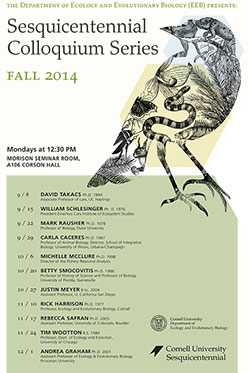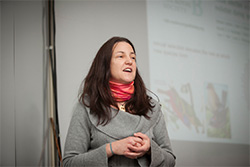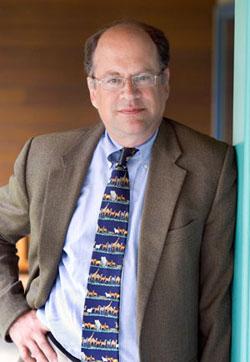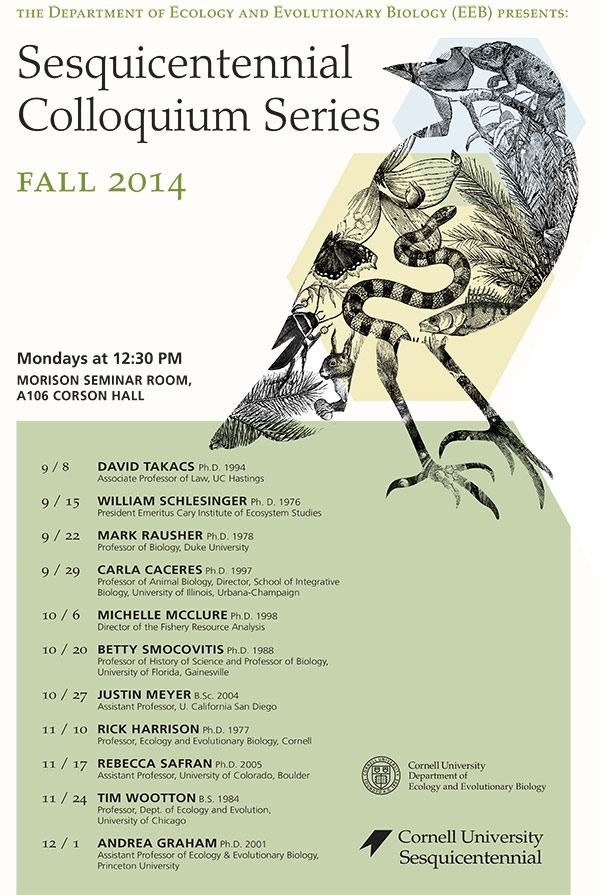
Studying the World's Ecosystems
The Department of Ecology and Evolutionary Biology celebrates 50 years of work by bringing back successful alumni in diverse careers.

Celebrating 50 Years
The Department of Ecology and Evolutionary Biology (EEB) will celebrate its 50th year – and the university's 150th – with a special Sesquicentennial Colloquium series in both the fall and spring semesters.

The series will bring back to Ithaca a selection of eminent alumni (both graduate and undergraduate) who span a broad range of experience, disciplines, educational institutions, and government and non-government organizations.

"Cornell's program in EEB has a long history of excellence, and the 2014-2015 seminar series provides a wonderful opportunity to celebrate that history and to allow our current students to interact with alumni who have made (and continue to make) important contributions to both basic and applied science and to science policy" said Rick Harrison Ph.D. '77, EEB professor.
Speakers will include some whose research is for the sake of knowledge and some who are using their knowledge to solve real-world problems. Students and faculty will have the chance to hear about their research work, as well as their career paths.
'Cornell Was Clearly the Best'

"When I attended Cornell, the field of biogeochemistry or ecosystem science was really coming on strong and Cornell was clearly the best," said William Schlesinger Ph.D. '76, one of the returning alumni and president emeritus of the Cary Institute of Ecosystem Studies. He is a retired professor from Duke and a member of the National Academy of Sciences.
Schlesinger was among the first to quantify the amount of carbon held in soil organic matter globally, providing subsequent estimates of the role of soils and human impacts on forests and soils in global climate change. "I received all kinds of encouragement at Cornell to study various things that interested me, including chemical cycling of cypress trees in the Okefenokee Forest and, later on, carbon estimation," Schlesinger said. His advisor was Professor Peter Marks, who studied the recovery of vegetation and plant succession on disturbed landscapes.
When Schlesinger was a student, Cornell's program in EEB included two scientists who would become members of the National Academy of Sciences. Robert Whittaker was a plant community ecologist, the first person to estimate green plant productivity for ecosystems of the world and a major innovator of methodologies of community analysis. Gene Likens was a co-founder of the long-term Hubbard Brook Ecosystem Study. He and his colleagues were the first scientists to discover acid rain in North America and to document the link between the combustion of fossil fuels and an increase in the acidity of precipitation. In 2001, Likens was awarded the National Medal of Science, the nation's highest science honor, for his contributions to the field of ecology
Combining Disciplines
At its founding in 1964, the Section of Ecology and Systematics (later renamed the Department of Ecology & Evolutionary Biology) was created as one of five "sections" of the Division of Biological Sciences. The growing faculty became a truly integrated group, including members of at least six departments from both Arts & Sciences and CALS: Botany, Zoology, Natural Resources, Entomology, History and Anthropology.
In the last 50 years, the department has been a leader, with undergraduates, graduate students and post-doctoral fellows populating the faculties of both major research institutions (e.g. Harvard, Yale, Princeton, Cornell, Columbia, Duke, Universities of Michigan, Wisconsin, California, Washington, etc.) and excellent small liberal arts institutions (e.g. Williams, Dickinson, Franklin & Marshall, Smith, Skidmore, University of the South), as well as playing leadership roles in both government and non-governmental organizations.
'Making a Difference' Matters
Michelle McClure, PhD '98, is now director of the Fishery Resource Analysis and Monitoring Division for the National Oceanographic and Atmospheric Administration (NOAA)'s Northwest Fishery Science Center in Seattle.
"I came to Cornell with an interest in birds and physical anthropology," McClure said. "But I ended up becoming interested in evolutionary questions and connecting with Amy McCune, who told me that her students study fish. So I studied fish. And it worked out well for me."
McClure's division provides the science to inform a council that establishes guidelines for management of marine fisheries up and down the west coast. Before her present position, McClure spent 13 years working on endangered species, particularly salmon, in the same region.
"The 'make-a-difference' aspect of my work has always mattered to me," she said about the work of NOAA, mentioning a recent article in the Seattle Times highlighting the news that 21 species of once-troubled West Coast bottom fish are now recovering so well that scientists say it's safe for consumers to start seeking them out at restaurants and markets.
McClure said Cornell was a good fit for her because of its reputation and its location in a small town on the east coast. Growing up on the west coast, she was ready for an adventure, she said, adding that she still misses the change of seasons, the fireflies and good bagels she enjoyed as a student here.
Fall Speakers
-
Sept. 8David Takacs, Ph.D. 1994 Associate Professor of Law, UC Hastings
-
Sept. 15William Schlesinger, Ph. D. 1976. President Emeritus Cary Institute of Ecosystem Studies
-
Sept. 22Mark Rausher, Ph.D. 1978. Professor of Biology, Duke University
-
Sept. 29Carla Caceres, Ph.D. 1997. Professor of Animal Biology, Director, School of Integrative Biology, University of Illinois, Urbana-Champaign
-
Oct. 6Michelle McClure, Ph.D. 1998. Director of the Fishery Resource Analysis and Monitoring Division at the Northwest Fisheries Science Center, NOAA
-
Oct. 20Betty Smocovitis, Ph.D. 1988. Professor of History of Science and Professor of Biology, University of Florida, Gainesville
-
Oct. 27Justin Meyer, B.Sc. 2004. Assistant Professor, U. California San Diego
-
Nov. 10Rick Harrison, Ph.D. 1977. Professor, Ecology and Evolutionary Biology, Cornell
-
Nov. 17Rebecca Safran, Ph.D. 2005. Assistant Professor, University of Colorado, Boulder
-
Nov. 24Tim Wootton, B.S. 1984. Professor, Dept. of Ecology and Evolution, University of Chicago.
-
Dec. 1Andrea Graham, Ph.D. 2001. Assistant Professor of Ecology & Evolutionary Biology, Princeton University
All seminars will take place at 12:30 p.m. on Mondays in the Morison Seminar Room, A106 Corson Hall and all are welcome to attend.
For more information on the series, contact Professor Rick Harrison at rgh4@cornell.edu.


